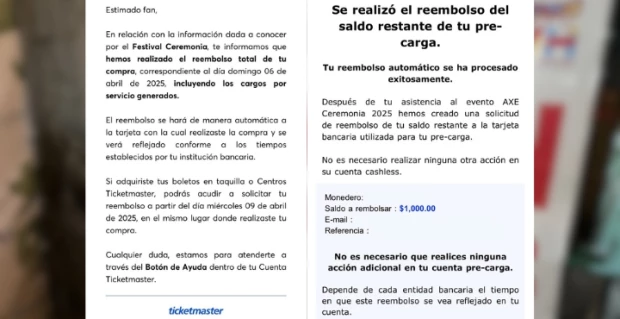Protect Yourself From Ticket Scams: A Warning From Ticketmaster

Table of Contents
Identifying Red Flags of Ticket Scams
Scammers employ various deceptive tactics to lure in unsuspecting buyers. Understanding these common methods is the first step in protecting yourself from ticket scams. They often create a sense of urgency, offering incredibly low prices or employing high-pressure sales techniques to push you into a quick transaction before you can think critically. Be wary of unofficial websites mimicking official platforms, emails from unknown senders promising exclusive deals, and social media advertisements offering tickets far below market value.
Here are some specific red flags to watch out for:
- Unusually low prices: If a deal seems too good to be true, it probably is. Legitimate tickets rarely sell significantly below face value, especially for popular events.
- Payment methods outside secure platforms: Avoid using wire transfers, prepaid debit cards, or other methods that offer little to no buyer protection. Stick to secure online payment gateways.
- Lack of seller information or verification: Legitimate sellers will readily provide verifiable information about themselves and their tickets.
- Pressure to buy immediately: Legitimate sellers won't pressure you into making an immediate purchase. Take your time to verify the authenticity of the offer.
- Poorly designed or unprofessional websites: Official ticket sites have professional designs; suspicious sites often look amateurish and untrustworthy.
- Suspicious emails or messages with grammatical errors: Legitimate organizations use professional communication; poorly written emails are a significant red flag.
- Tickets sold through unofficial resale marketplaces without guarantees: While some resale marketplaces are reputable, many lack buyer protection, leaving you vulnerable.
Safe Ticket Purchasing Practices
The best way to protect yourself from ticket scams is to buy tickets only from trusted and verified sources. This significantly reduces the risk of encountering fraudulent tickets or losing your money.
- Always buy from official sources: Purchase tickets directly from the venue's box office, the official event promoter's website (like Ticketmaster), or authorized ticket resellers.
- Use secure payment methods: Utilize credit cards or other payment methods with robust buyer protection programs. This allows you to dispute fraudulent charges.
- Read reviews and ratings: Before buying from a reseller, check online reviews and ratings to gauge their reputation.
- Check the seller's reputation: Look for established sellers with a history of positive feedback and verifiable contact information.
- Transfer tickets electronically if possible: Electronic ticket transfers offer more security and reduce the risk of counterfeit tickets.
What to Do if You've Been Scammed
If you suspect you've been scammed, act quickly to mitigate the damage.
- Report to law enforcement: File a report with your local police department and the Federal Trade Commission (FTC). Provide as much detail as possible, including communication records and transaction information.
- Contact your bank/credit card company: Immediately dispute any fraudulent charges made to your account. This can help recover your funds.
- Report to the platform: If the scam occurred on a specific platform (e.g., Facebook, Craigslist), report the incident to the platform's customer support team.
- Document all communication and transactions: Keep records of all emails, messages, and payment confirmations for your police report and any disputes with your bank.
Ticketmaster's Official Resources and Protection
Ticketmaster is committed to protecting its customers from fraudulent ticket sales. Visit the official Ticketmaster website for resources on safe ticket purchasing and to learn more about their buyer protection policies, including the Ticketmaster Fan Guarantee, which offers protection against certain types of fraudulent tickets. Their website provides valuable information and tools to help you make informed and safe purchasing decisions.
Protect Yourself from Ticket Scams: A Final Warning
Remember, vigilance and caution are key to protecting yourself from ticket scams. By carefully examining ticket offers, using secure payment methods, and purchasing from trusted sources, you significantly reduce your risk. Don't let the excitement of an upcoming event lead to careless purchasing decisions. Protect yourself from ticket scams by following these tips and purchasing tickets only through official channels. Don't let scammers ruin your event!
[Link to Ticketmaster's Official Website]

Featured Posts
-
 Programma Tileoptikon Metadoseon Kyriakis 16 Martioy
May 30, 2025
Programma Tileoptikon Metadoseon Kyriakis 16 Martioy
May 30, 2025 -
 Festival Axe Ceremonia 2025 Cancelado Como Solicitar Tu Reembolso En Ticketmaster
May 30, 2025
Festival Axe Ceremonia 2025 Cancelado Como Solicitar Tu Reembolso En Ticketmaster
May 30, 2025 -
 Le Depute Jacobelli Se Felicite De La Celerite Du Proces Rn En Appel
May 30, 2025
Le Depute Jacobelli Se Felicite De La Celerite Du Proces Rn En Appel
May 30, 2025 -
 Alcaraz Overcomes Adversity To Win Monaco Title
May 30, 2025
Alcaraz Overcomes Adversity To Win Monaco Title
May 30, 2025 -
 Texas Under Extreme Heat Warning 111 F Temperatures Expected
May 30, 2025
Texas Under Extreme Heat Warning 111 F Temperatures Expected
May 30, 2025
